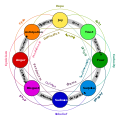Psychology
The problem with obsessive love is not so much a question of loving too intensely, but rather of anger over rejection, or feelings of abandonment. [37] Susan Forward states that in her practice, she found four conditions which helped clarify when somebody is suffering from obsessive love: [38]
- They must have a painful, all-consuming preoccupation with a real or wished-for lover.
- They must have an insatiable longing either to possess or to be possessed by the target of their obsession.
- Their target must have rejected them or be unavailable in some way, either physically or emotionally.
- Their target's unavailability or rejection must drive them to behave in self-defeating ways.
— Susan Forward, Obsessive Love: When It Hurts Too Much to Let Go
John Moore describes the process of those who "confuse love with obsession" as a cycle of four phases he calls the "Obsessive Relational Progression": [39]
- Attraction, characterized by an initial overwhelming attraction to a new person, unrealistic fantasies, an immediate urge to rush into a relationship, and the start of controlling behaviors.
- Anxiety, a turning point which usually occurs after a commitment has been made, where unfounded thoughts of infidelity, betrayal and fear of abandonment occur, resulting in mistrust, depression, anxiety, and the escalation of controlling behaviors.
- Obsession, when extreme behaviors begin to overwhelm, resulting in obsessive surveillance, stalking, and possibly violence.
- Destruction, where the partner flees the relationship.
Obsessive love may be related to the anxious attachment style. [40] The mania love attitude (for obsessive, dependent love) has been correlated with attachment anxiety, and also the personality trait neuroticism. [41] [42] A study using the Passionate Love Scale showed that while passionate love with obsession was associated with relationship satisfaction in short-term relationships, it was associated with slightly decreased satisfaction over time. [17]
In the dualistic model of passion, a distinction is made between two types of passion: harmonious passion (where the person experiencing it feels positive and in control) and obsessive passion (where the person experiencing it feels a loss of control, and it interferes with their life). This is reminiscent of the distinction between the love styles eros (harmonious) and mania (obsessive). One study found that harmonious romantic passion was strongly correlated (positively) with secure attachment, and obsessive romantic passion was moderately correlated (positively) with anxious attachment. Obsessive passion has also been associated with maladaptive conflict resolution strategies in relationships (e.g. criticism, contempt, defensiveness). [43]
The anthropologist Helen Fisher believed that "abandonment rage" (anger after a rejection) can be explained in terms of the frustration–aggression hypothesis, where rage is triggered when an expected reward is in jeopardy. Romantic love and rage are connected in the brain by similar circuitry; both involve arousal and energy production, and both drive obsessive focus and goal-directed behaviors. Fisher believed that ordinarily the evolutionary purpose of abandonment rage is to facilitate separation and the search for a new partner, although sometimes abandonment rage erupts into violence instead. [44]
Another feature of obsessive love is jealousy, [45] which seems to be related to OCD for its obsessional qualities and compulsive checking (for signs of infidelity). This can also take the form of pathological jealousy (or "Othello syndrome") where the sufferer has a delusional or paranoid belief in their partner's infidelity despite actual evidence. [46] Jealousy is strongly associated with irritability, which can erupt into violence: spousal murder is often related to infidelity (real or suspected). It has been suggested that this seemingly self-defeating behavior of murdering one's own partner results from a kind of "brinkmanship", where a looming threat of violence is used to control women as sexual partners—a threat which sometimes (paradoxically) escalates into actual violence to be "credible". [47]
It is argued that non-pathological jealousy evolved as protection against reproductive competition, which is adaptive as long as it serves to maintain a relationship. [48]
Stalking
Love obsessionality can in some cases lead to stalking, although stalkers also often have other conditions. [9] Like falling in love, stalking is also described as a form of addiction. [49] A 1999 study by Paul Mullen and colleagues classified 145 stalkers according to several kinds of groups: [7]
- Rejected ex-partners (41 of 145), who mostly had personality disorders, although 9 were delusional, 5 of whom had morbid jealousy. Rejected stalkers often had mixed desire for reconciliation and revenge, as well as frustration, anger, jealousy, vindictiveness, and sadness.
- Intimacy seekers (49 of 145), who were attempting to establish an intimate relationship with their "true love", most of whom were delusional, and further classified as follows:
- Those with erotomania (27 of 145), with a delusional belief their love was reciprocated.
- Those with morbid infatuations (22 of 145), who did not believe their love was reciprocated but still believed a delusion of their eventual success.
- Those who had personality disorders (7 of 145), but were not delusional.
- Incompetent stalkers (22 of 145), who regarded their victims as attractive potential partners, but who were intellectually limited and socially incompetent instead of being infatuated.
- The other 33 stalkers identified by the study had motives other than a relationship (e.g. broken friendships/family, sexual predation, or scaring a victim).
Limerence is another type of love obsession which is being compared to the others, but the motives and emotional foundations behind limerence are different from stalking. [9] [50] A person in limerence hopes for mutual feelings, and their mood depends on whether their romantic interest seems to be returned, whereas the motive for stalking is to force contact, control or punish a victim for rejection. Limerence can cause distress if it becomes too intense, but it's also a feature of early-stage romantic love for many people. [9]
This page is based on this
Wikipedia article Text is available under the
CC BY-SA 4.0 license; additional terms may apply.
Images, videos and audio are available under their respective licenses.



